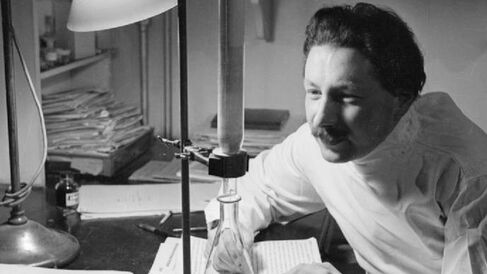Ernst Boris Chain

Nobel Prize in Physiology or Medicine 1945 for the discovery of penicillin and its curative effect in various infectious diseases, shared with Sir Alexander Fleming and Sir Howard Walter Florey.
Department of Biochemistry PhD student (1933-1935).
Ernst Chain was born in Berlin in 1906 where his father had established a chemical factory. With this background it is unsurprising that he studied chemistry and physiology at the Friedrich-Wilhelm University and completed a D.Phil. (on the optical specificity of esterases) in the Institute of Pathology at the Charité Hospital. This early career brought him into contact with luminaries including Walther Nernst, Max Planck, Otto Hahn and Otto Warburg, a pantheon that is testimony to the astonishing German scientific talent of the 1920s and 30s.
At the same time Chain became a sufficiently able pianist to give public concerts. He was for a while the music critic of the Berlin evening paper Welt am Abend and seriously considered a musical career.
Chain's family was Jewish and, after Hitler came to power, he lost no time in seeking refuge in England. His father had died when he was thirteen. His mother and sister stayed in Berlin only to perish in a concentration camp.
Chain's first position in England was at University College Hospital but, unimpressed by the facilities there, he quickly moved to the Department of Biochemistry in Cambridge despite Norman Pirie's warning that things were even worse there! Nevertheless he completed a PhD on the acid-base properties of the phospholipids lecithin and cephalin under the supervision of Frederick Gowland Hopkins whom he greatly admired.
In 1935 Howard Florey became Professor of Pathology at Oxford and in September 1935 Chain joined him in the new Sir William Dunn School. Chain's general area of research had always lain in enzymology and Florey suggested that he look at the action of lysozyme, the bacteriolytic enzyme that Alexander Fleming had identified in 1920. Whilst working on this enzyme Chain came across Fleming's paper on penicillin from the fungus Penicillium notatum. Earlier attempts in 1932 to purifypenicillin had failed, but Florey and Chain agreed that the time was now ripe for a thorough investigation of antimicrobial substances so Chain began experiments with Penicillium in the winter of 1938-1939.
The relationship between these two men was famously not frictionless but they are both on record in their agreement that the decision to work on penicillin was driven by biochemical curiosity and not at all by the possibility of clinical benefit. Florey observed: "People sometimes think that I and the others worked on penicillin because we were interested in suffering humanity. I don't think it ever crossed our minds about suffering humanity. This was an interesting scientific exercise, and because it was of some use in medicine is very gratifying, but this was not the reason that we started working on it."
By this time Florey's group had been strengthened by the arrival, also from Cambridge, of the ingenious Norman Heatley. It was Heatley who devised the back-extraction technique for efficiently purifying penicillin in bulk wherein the active ingredient of penicillin was transferred back into water by changing its acidity.
The critical experiment came in May 1940 (Heatley's diary records it as 11 am on Saturday 25th May 1940) when eight mice were systemically infected by intra-peritoneal injection of a lethal dose of Streptococcus pyogenes. One hour later four of the mice were given sub-cutaneous injections of penicillin. In the morning the untreated mice were dead. Those treated with penicillin were fine and survived for days to weeks. The anecdotal tale is that when Chain arrived and saw the live mice he danced in excitement.
This led to the large-scale production of pure penicillin and the resolution of its chemistry. So momentous was this work it is now an almost insignificant footnote that, for resolving the mechanism of action of penicillin, Ernst Chain and Howard Florey shared the 1945 Nobel Prize in Physiology or Medicine with Alexander Fleming.
